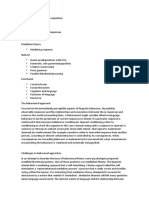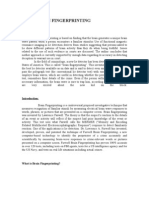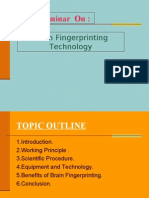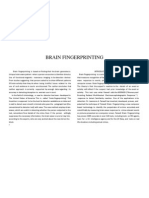D-3 Brain Finger Printing Technology
D-3 Brain Finger Printing Technology
Uploaded by
Arjun AnduriCopyright:
Available Formats
D-3 Brain Finger Printing Technology
D-3 Brain Finger Printing Technology
Uploaded by
Arjun AnduriCopyright
Available Formats
Share this document
Did you find this document useful?
Is this content inappropriate?
Copyright:
Available Formats
D-3 Brain Finger Printing Technology
D-3 Brain Finger Printing Technology
Uploaded by
Arjun AnduriCopyright:
Available Formats
P.B.R.
VISVODAYA INSTITUTE OF TECHNOLOGY AND SCIENCE,KAVALI
The Brain Fingerprinting Technology
A patented new technique of proven accuracy
Name: P.V.Sree Vyshnavi Roll no: 09731a0476 Branch: III-II ECE Email id: vyshnavi_s@yahoo.in Phone no.: 9247132719
Name: Sk.Anifa Roll no: 09731a0490 Branch: III-II ECE Email id: anifa999@gmail.com Phone no.: 9494637145
ABSTRACT: Brain Fingerprinting is a new computer-based technology to identify the perpetrator of a crime accurately and scientifically by measuring brain-wave responses to crimerelevant words or pictures presented on a computer screen. Brain Fingerprinting has proven 100% accurate in over 120 tests, including tests on FBI agents, tests for a US intelligence agency and for the US Navy, and tests on real-life situations including felony crimes. The Brain Fingerprinting testing system detects information directly on the basis of the electrophysiological manifestations of information processing brain activity, measured non-invasively from the scalp with MERA (multifaceted electroencephalographic response analysis). Brain Fingerprinting testing depends only on brain information processing and responses to specific stimuli. It does not depend on the emotional response of the subject and is not subject to control or manipulation by the person being tested. Why Brain Fingerprinting??? Brain Fingerprinting is based on the principle that the brain is central to all human acts. In a criminal act, there may or may not be many kinds of peripheral evidence, but the brain is always recording accused, there, the planning, crime. executing, The is and
perpetrator, having committed the crime, has the details of the crime stored in his brain, and the innocent suspect does not. This is what Brain Fingerprinting detects scientifically The secrets of Brain Fingerprinting Matching evidence at the crime scene with evidence in the brain When a crime is committed, a record is stored in the brain of the perpetrator. Brain Fingerprinting provides a means to objectively and scientifically connect evidence from the crime scene with evidence stored in the brain. (This is similar to the process of connecting DNA samples from the perpetrator with biological evidence found at the scene of the crime; only the evidence evaluated by Brain Fingerprinting is evidence stored in the brain.) Brain Fingerprinting measures electrical brain activity in response to crime-relevant words or pictures presented on a computer screen, and reveals a brain MERMER (memory and encoding related multifaceted electroencephalographic response) when, and only when, the evidence stored in the brain matches the evidence from the crime scene. Thus, the guilty can be identified and the innocent can be cleared in an accurate, scientific, objective, non-invasive, nonstressful, and non-testimonial manner MERMER Methodology The procedure used is similar to the Guilty Knowledge Test; a series of words, sounds, or
fundamental that the
difference between a perpetrator and a falsely innocent person
pictures are presented via computer to the subject for a fraction of a second each. Each of these stimuli are organised by the test-giver to be a Target, Irrelevant, or a Probe. The Target stimuli are chosen to be relevant information to the tested subject, and are used to establish a baseline brain response for information that is significant to the subject being tested. The subject is instructed to press on button for Targets, and another button for all other stimuli. Most of the non-Target stimuli are Irrelevant, and are totally unrelated to the situation that the subject is being tested for. The Irrelevant stimuli do not elicit a MERMER, and so establish a baseline brain response for information that is insignificant to the subject in this context. Some of the nonTarget is relevant to the situation that the subject is being tested for. These stimuli, Probes, are relevant to the test, and are significant to the subject, and will elicit a MERMER, signifying that the subject has understood that stimuli to be significant. A subject lacking this information in their brain, the response to the Probe stimulus will be indistinguishable from the irrelevant stimulus. This response does not elicit a MERMER, indicating that the information is absent from their mind. Note that there does not have to be an emotional response of any kind to the stimuli- this test is entirely reliant upon recognition response to the stimuli, and relies upon a difference in recognition- hence the association with the Oddball effect THE FANTASTIC FOUR!!! The four phases of Brain Fingerprinting
In fingerprinting and DNA fingerprinting, evidence recognized and collected at the crime scene, and preserved properly until a suspect is apprehended, is scientifically compared with evidence on the person of the suspect to detect a match that would place the suspect at the crime scene. Brain Fingerprinting works similarly, except that the evidence collected both at the crime scene and on the person of the suspect (i.e., in the brain as revealed by electrical brain responses) is informational evidence rather than physical evidence. There are four stages to Brain Fingerprinting, which are similar to the steps in fingerprinting and DNA fingerprinting: 1. Brain Fingerprinting Crime Scene Evidence Collection; 2. Brain Fingerprinting Brain Evidence Collection; 3. Brain Fingerprinting Computer Evidence Analysis; and 4. Brain Fingerprinting Scientific Result. In the Crime Scene Evidence Collection, an expert in Brain Fingerprinting examines the crime scene and other evidence connected with the crime to identify details of the crime that would be known only to the perpetrator. The expert then conducts the Brain Evidence Collection in order to determine whether or not the evidence from the crime scene matches evidence stored in the brain of the suspect. In the Computer Evidence Analysis, the Brain Fingerprinting system makes a mathematical
determination as to whether or not this specific evidence is stored in the brain, and computes a statistical confidence for that determination. This determination and statistical confidence constitute the Scientific Result of Brain Fingerprinting: either "information present" ("guilty") the details of the crime are stored in the brain of the suspect or "information absent" ("innocent") the details of the crime is not stored in the brain of the suspect Scientific Applications 1. Informational Evidence Detection. The detection of concealed information stored in the brains of suspects, witnesses, intelligence sources, and others is of central concern to all phases of law enforcement, government and private investigations, and intelligence operations. Brain Fingerprinting presents a new paradigm in forensic science. This new system detects information directly, on the basis of the electrophysiological manifestations of information-processing brain activity, measured non-invasively from the scalp. Since Brain Fingerprinting depends only on brain information processing, it does not depend on the emotional response of the subject. 2 The Brain MERMER Brain Fingerprinting utilizes multifaceted electroencephalographic response analysis (MERA) to detect information stored in the human brain. A memory and encoding related Procedure, Research, and
multifaceted electroencephalographic response (MERMER) is elicited when an individual recognizes and processes an incoming stimulus that is significant or noteworthy. When an irrelevant stimulus is seen, it is insignificant and not noteworthy, and the MERMER response is absent. The MERMER occurs within about a second after the stimulus presentation, and can be readily detected using EEG amplifiers and a computerized signaldetection algorithm.
3. Scientific Procedure Brain Fingerprinting incorporates the
following procedure. A sequence of words or pictures is presented on a video monitor under computer control. Each stimulus appears for a fraction of a second. Three types of stimuli are presented: "probes." The targets are made relevant and noteworthy to all subjects: the subject is given a list of the target stimuli and instructed to press a particular button in response to targets, and to press another button in response to all other stimuli. Since the targets are noteworthy for the subject, they elicit a MERMER. Most of the non-target stimuli are irrelevant, having no relation to the crime. These irrelevants do not elicit a MERMER. Some of the non-target stimuli are relevant to the crime or situation under investigation. These relevant stimuli are referred to as "targets," "irrelevant," and
probes. For a subject who has committed the crime, the probes are noteworthy due to his knowledge of the details of the crime, and therefore probes elicit a brain MERMER. For an innocent subject lacking this detailed knowledge of the crime, the probes are indistinguishable from the irrelevant stimuli. For such a subject, the probes are not noteworthy, and thus probes do not elicit a MERMER. 4. Computer Controlled The entire Brain Fingerprinting System is under computer control, including presentation of the stimuli and recording of electrical brain activity, as well as a mathematical data analysis algorithm that compares the responses to the three types of stimuli and produces a determination ("guilty") or of "information "information present" absent" Brain waves:
("innocent"), and a statistical confidence level for this determination. At no time during the testing and data analysis do any biases and interpretations of a system expert affect the stimulus presentation or brain responses. Using brain waves to detect guilt How it works A Suspect is tested by looking at three kinds of information represented by Different The devices used in brain fingerprinting colored lines: -----Red: information the suspect is expected to know -----Green: information not known to suspect
-----Blue: information of the crime that only perpetrator would know
actual cases conducted at the Federal Bureau of Investigation, a US intelligence agency, the Alexandria (VA) Police Department, the offices of the Macon County (MO) Sheriff, and other organizations and individuals. Some of these tests are described below. Terry Harrington's Brain-Wave Responses
NOT GUILTY: Because the blue and blue and red Green lines closely correlate, Correlate, suspect has critical Doesnt have of time Critical knowledge of crime
GUILTY: Because the Lines closely and suspect knowledge
Scientific Experiments, Field Tests, and Criminal Cases Scientific studies, field tests, and actual criminal cases involving over 120 individuals described in various scientific publications and technical reports by Dr. Lawrence A. Farwell have verified the extremely high level of accuracy and overall effectiveness of Brain Fingerprinting. The system had 100% accurate scientific results in all studies, field tests, and
X-axis: time in milliseconds (msec). Stimulus was presented at 0 msec Y-axis: voltage in micro volts at the parietal (Pz) scalp site. Determination: information absent. Statistical Confidence: 99.9% Conclusion: Certain significant details of the murder of John Schweer are not stored in Terry Harrington's brain
Determination: information present. Statistical Confidence: 99.9% Conclusion: Certain significant details of the murder of John Schweer are stored in Terry Harrington's brain. For the test on Schweer's murder, the determination of Brain Fingerprinting was
"information
absent,"
with
statistical
1. Lander ES. DNA fingerprinting on trial. Nature 1989. 2. Simpson L. Courts Ready to Accept DNA Profiling As Evidence. Sydney Morning Herald 4 March 1989. 3. Lambourne GTC. The Use of Fingerprints in Identification. Med. Sci Law 1979. 4. Kasprzak J. Possibilities of Cheiloscopy. Forensic Sci Int. 1990. 5. Farwell LA and Smith SS. Using Brain MERMER Testing To Detect Concealed Knowledge Despite Efforts To Conceal Journal of Forensic Sciences 2001. 6. Farwell LA and Donchin E. The Truth Will Out: Interrogative Polygraphy (Lie Detection) With Event Related Potentials. 7. Farwell LA. brainwavescience.com.
confidence of 99.9%. The information stored in Harrington's brain did not match the scenario in which Harrington went to the crime scene and committed the murder. The determination of the Brain Fingerprinting test for alibi-relevant information was "information present," with a confidence of 99.9%. The information stored in Harrington's brain did match the scenario in which Harrington was elsewhere (at a concert and with friends) at the time of the crime. Applications: Counter terrorism Criminal justice Medical
8. Wasserman S, Bockenholt U. (1989). Bootstrapping: applications to bioinformatics and secure authentication analysis Dept.of Defence Research
Conclusion Brain Fingerprinting is a revolutionary new scientific technology for solving crimes, identifying perpetrators, and exonerating innocent suspects, with a record of 100% accuracy in research with US government agencies, actual criminal cases, and other applications. The technology fulfills an urgent need for governments, law enforcement agencies, corporations, investigators, crime victims, and falsely accused innocent suspects.
References
You might also like
- Circle Time Lesson PlanDocument2 pagesCircle Time Lesson Plangrg100% (1)
- Reading and Writing Teaching GuideDocument26 pagesReading and Writing Teaching GuideRajiah Myrrs100% (3)
- Structural, Functional or Interactional Behaviorist CognitiveDocument5 pagesStructural, Functional or Interactional Behaviorist CognitiveRosmery Ribera100% (3)
- Instructional Design ModelsDocument30 pagesInstructional Design Modelsschattenhz100% (7)
- Theories of First Language AcquisitionDocument2 pagesTheories of First Language AcquisitionYanina RojasNo ratings yet
- Maddy, P. 2003, Second Philosophy (Lakatos Award Lecture)Document34 pagesMaddy, P. 2003, Second Philosophy (Lakatos Award Lecture)khrinizNo ratings yet
- The Secrets of Brain FingerprintingDocument7 pagesThe Secrets of Brain FingerprintingSomya MishraNo ratings yet
- The Brain Fingerprinting Technology: - A Patented New Technique of Proven AccuracyDocument11 pagesThe Brain Fingerprinting Technology: - A Patented New Technique of Proven AccuracyAnusha KadlurNo ratings yet
- Brain FingerDocument12 pagesBrain FingernagtarunNo ratings yet
- The Brain Fingerprinting Technology: - A Patented New Technique of Proven AccuracyDocument13 pagesThe Brain Fingerprinting Technology: - A Patented New Technique of Proven Accuracypavan96No ratings yet
- Brainfingerprinting 110326090537 Phpapp02Document19 pagesBrainfingerprinting 110326090537 Phpapp02sumeet_ppNo ratings yet
- Brain Fingerprinting TechnologyDocument21 pagesBrain Fingerprinting TechnologyAnu AnithaNo ratings yet
- P Brain-FingerprintingDocument9 pagesP Brain-FingerprintingDharmendra PothumarthyNo ratings yet
- The Brain Fingerprinting Technology: Presented byDocument11 pagesThe Brain Fingerprinting Technology: Presented byB Rajashekar ReddyNo ratings yet
- Brain FingerprintingDocument9 pagesBrain FingerprintingKumar JayawardhaneNo ratings yet
- Brain Finger Printing REPORTDocument11 pagesBrain Finger Printing REPORTManvi BrahmwarNo ratings yet
- Brain FingerprintingDocument10 pagesBrain FingerprintingPinky JoseNo ratings yet
- The Brain Fingerprinting TechnologyDocument6 pagesThe Brain Fingerprinting TechnologyLavanya KandukuriNo ratings yet
- Brain FingerprintinghhDocument10 pagesBrain FingerprintinghhYedu KrishnaNo ratings yet
- Brain FingerPrintingDocument9 pagesBrain FingerPrintingLakshmi MadavanNo ratings yet
- Brain FingerprintingDocument16 pagesBrain FingerprintingAnusha GoudNo ratings yet
- The Brain Fingerprinting TechnologyDocument19 pagesThe Brain Fingerprinting TechnologySahu BhimaNo ratings yet
- Brain Fingerprinting TechnologyDocument7 pagesBrain Fingerprinting TechnologyAryanKumarNo ratings yet
- Brain FingerprintingDocument21 pagesBrain FingerprintingKishan SoniNo ratings yet
- Brain Finger PrintingDocument13 pagesBrain Finger PrintingNeha NiaNo ratings yet
- Brain Finger Print Technology Abstract-1Document5 pagesBrain Finger Print Technology Abstract-1KARTHIK KUMAR MNo ratings yet
- A Review of Brain Fingerprinting ProcessDocument5 pagesA Review of Brain Fingerprinting ProcessPARVATHY SUNILNo ratings yet
- AlphaDocument28 pagesAlphaRajesh BaabuNo ratings yet
- Seminar Report On: Brain FingerprintingDocument23 pagesSeminar Report On: Brain FingerprintingrajendarnaikNo ratings yet
- Brain Fingerprinting TechnologyDocument7 pagesBrain Fingerprinting TechnologyVenkataKartheek NuneNo ratings yet
- The Secrets of Brain FingerprintingDocument7 pagesThe Secrets of Brain FingerprintingvivekrajagopalNo ratings yet
- Brain FingerDocument16 pagesBrain FingerjenithsweetyNo ratings yet
- Brain FingerprintingDocument14 pagesBrain FingerprintingSiddhartha BashettyNo ratings yet
- Brain Fingerprinting Technology 1Document2 pagesBrain Fingerprinting Technology 1Ramesh Ramesh T NNo ratings yet
- Brain Finger Print TechnologyDocument7 pagesBrain Finger Print TechnologySirisha YalamanchiliNo ratings yet
- Brain Fingering PrintDocument2 pagesBrain Fingering PrintVenkatesh PasunooriNo ratings yet
- Brain Fingerprinting TechnologyDocument19 pagesBrain Fingerprinting TechnologyEr. Amar Kumar100% (2)
- Brain Fingerfrint Technology: by K.Pavan Giri ShashankDocument16 pagesBrain Fingerfrint Technology: by K.Pavan Giri ShashankprinceNo ratings yet
- Brain FingerprintingDocument4 pagesBrain Fingerprintingnaina_cutieNo ratings yet
- Brainfingerprinting: Bharti NarodeDocument6 pagesBrainfingerprinting: Bharti NarodeBharti NarodeNo ratings yet
- Brain FingerprintingDocument2 pagesBrain FingerprintingNikita JainNo ratings yet
- RVR Institute of Engineering & TechnologyDocument13 pagesRVR Institute of Engineering & TechnologyAnusha KommineniNo ratings yet
- Brain Finger PrintingDocument15 pagesBrain Finger Printingpradeep684No ratings yet
- ManuscriptDocument5 pagesManuscriptJeena Mariya JacobNo ratings yet
- Seminar Report On: "Brain Fingerprinting"Document20 pagesSeminar Report On: "Brain Fingerprinting"Priyadarshini Behera Vyas0% (1)
- Brain Fingerprinting Word Note 1Document4 pagesBrain Fingerprinting Word Note 1arattupuzhaNo ratings yet
- Brain Fingerprinting: Geethika Muppa 06771A0528 4-2, CSE February 26, 2010Document21 pagesBrain Fingerprinting: Geethika Muppa 06771A0528 4-2, CSE February 26, 2010gpurple89No ratings yet
- Brain FingerprintingDocument12 pagesBrain FingerprintingPriyadarshini Behera Vyas67% (6)
- Brain Fingerprinting: Full Length Research PaperDocument6 pagesBrain Fingerprinting: Full Length Research PaperhitmanamitNo ratings yet
- Brain Finger PrintingDocument32 pagesBrain Finger PrintingNikita AgarwalNo ratings yet
- Brain FingerprintingDocument16 pagesBrain FingerprintingVemula Lohith KumarNo ratings yet
- Brain Fingerprinting TechnologyDocument4 pagesBrain Fingerprinting TechnologyVishnuvardan JayachandranNo ratings yet
- Brain FingerprintingDocument18 pagesBrain Fingerprintingvikky499No ratings yet
- Brain Fingerprinting: Hod of Cse. MR Surai KiskuDocument30 pagesBrain Fingerprinting: Hod of Cse. MR Surai KiskuninurecNo ratings yet
- IeeeDocument1 pageIeeeGeethika ReddyNo ratings yet
- Brain Fingerprinting: Ashwini V. Sharma Dr. Ganesh S. SableDocument7 pagesBrain Fingerprinting: Ashwini V. Sharma Dr. Ganesh S. SableRohan PatelNo ratings yet
- Brain FingerprintingDocument18 pagesBrain Fingerprintingreddyraj520No ratings yet
- A Study On Brain Fingerprinting TechnologyDocument13 pagesA Study On Brain Fingerprinting TechnologyUcheson NwokeNo ratings yet
- Fin Irjmets1656499429Document7 pagesFin Irjmets1656499429tg467900No ratings yet
- Forensic PsychologyDocument21 pagesForensic PsychologyTapeshwar Bhardwaj0% (1)
- Brain Fingerprinting - FINALDocument19 pagesBrain Fingerprinting - FINALNeha BaisNo ratings yet
- Brain Electrical Oscillation Signature Profiling BeospDocument8 pagesBrain Electrical Oscillation Signature Profiling Beospshahdishaa988No ratings yet
- The Battle for Your Brain: Defending the Right to Think Freely in the Age of NeurotechnologyFrom EverandThe Battle for Your Brain: Defending the Right to Think Freely in the Age of NeurotechnologyNo ratings yet
- Deceived Beyond Belief: The Awakening: PrologueFrom EverandDeceived Beyond Belief: The Awakening: PrologueRating: 4.5 out of 5 stars4.5/5 (4)
- Digital Bike Operating System Sans KeyDocument8 pagesDigital Bike Operating System Sans KeyArjun AnduriNo ratings yet
- Fadec: Navigation SearchDocument4 pagesFadec: Navigation SearchArjun AnduriNo ratings yet
- Fadec: Navigation SearchDocument4 pagesFadec: Navigation SearchArjun AnduriNo ratings yet
- Graduate Marine Engineering Course - 1 Year: Course Code Course Title / Duration Eligibility Starting DateDocument6 pagesGraduate Marine Engineering Course - 1 Year: Course Code Course Title / Duration Eligibility Starting DateArjun AnduriNo ratings yet
- 86.movement Based Voice Enabled Wireless Device Switching and Basic Needs For Physically Challenged Using ARM7.Document3 pages86.movement Based Voice Enabled Wireless Device Switching and Basic Needs For Physically Challenged Using ARM7.Arjun AnduriNo ratings yet
- Fadec: Navigation SearchDocument4 pagesFadec: Navigation SearchArjun AnduriNo ratings yet
- Fadec: Navigation SearchDocument4 pagesFadec: Navigation SearchArjun AnduriNo ratings yet
- Brain Controlled Car For DisabledDocument7 pagesBrain Controlled Car For DisabledArjun AnduriNo ratings yet
- Unit 1 Awp MCQDocument1 pageUnit 1 Awp MCQArjun AnduriNo ratings yet
- Parts of A Research PaperDocument4 pagesParts of A Research PaperNaidin Catherine De Guzman-AlcalaNo ratings yet
- 398 - PDFsam - Joseph A. DeVito - Human Communication - The Basic Course-Pearson (2018)Document1 page398 - PDFsam - Joseph A. DeVito - Human Communication - The Basic Course-Pearson (2018)Mási de LaféNo ratings yet
- Eapp Week 11Document3 pagesEapp Week 11rose suarezNo ratings yet
- Detailed Lesson Plan (DLP) Format: Instructional PlanningDocument7 pagesDetailed Lesson Plan (DLP) Format: Instructional PlanningChona M. RosalitaNo ratings yet
- Implementing Performance AssessmentDocument5 pagesImplementing Performance AssessmentMed Fouad BellmirNo ratings yet
- Argumentation Ethics and LibertyDocument2 pagesArgumentation Ethics and LibertyAnonymous ORqO5yNo ratings yet
- Revised New PTLLS Assignment 4 Levels 3 and 4 Nov 2011Document3 pagesRevised New PTLLS Assignment 4 Levels 3 and 4 Nov 2011dave_perry189218No ratings yet
- Feminist Interpretations AristotleDocument7 pagesFeminist Interpretations Aristotlesayonee73No ratings yet
- Evaluation Criteria - Spoken Word PoetryDocument3 pagesEvaluation Criteria - Spoken Word Poetryma. victoria comayasNo ratings yet
- Correlation Reading and WritingDocument5 pagesCorrelation Reading and WritingZaedatul HusnaNo ratings yet
- DREAMSDocument1 pageDREAMSRiza Villarias0% (1)
- Pragmatics (Gricean Implicature) Part2Document10 pagesPragmatics (Gricean Implicature) Part2Ahmed SalihNo ratings yet
- Creative TeacherDocument11 pagesCreative TeacherLina Ting100% (1)
- GroupthinkDocument15 pagesGroupthinkRoshan BudhathokiNo ratings yet
- Module 004 - Transcendence and The Human BodyDocument4 pagesModule 004 - Transcendence and The Human BodyRonald Pacquiao Macasero0% (1)
- LeMoult & Gotlib - 2019 - Depression A Cognitive PerspectiveDocument16 pagesLeMoult & Gotlib - 2019 - Depression A Cognitive PerspectivePaloma GonzálezNo ratings yet
- Grammar Is The Structural Foundation of Our Ability To Express OurselvesDocument2 pagesGrammar Is The Structural Foundation of Our Ability To Express OurselvesAyhuwrNo ratings yet
- The Self From Various Philosophical Perspectives PhilosophyDocument6 pagesThe Self From Various Philosophical Perspectives PhilosophyLarisse LarozaNo ratings yet
- Ibn SinaDocument10 pagesIbn SinaSaikat PayraNo ratings yet
- Research ProposalDocument4 pagesResearch ProposalAnonymous cm3q67h3MY100% (1)
- Creative & Critical Thinking Lecture 1Document42 pagesCreative & Critical Thinking Lecture 1Mark MumbaNo ratings yet
- 5 Ways To Formulate The Research ProblemDocument2 pages5 Ways To Formulate The Research ProblemJupiterJuantaNo ratings yet
- Charles TownesDocument2 pagesCharles TownesNARENDRA KUMAR100% (1)
- FULL TEXT: GES Introduces New Curriculum For Primary SchoolsDocument665 pagesFULL TEXT: GES Introduces New Curriculum For Primary SchoolsNewsWire GH100% (3)































































































